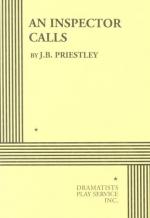|
This section contains 764 words (approx. 2 pages at 400 words per page) |

|
An Inspector Calls Summary & Study Guide Description
An Inspector Calls Summary & Study Guide includes comprehensive information and analysis to help you understand the book. This study guide contains the following sections:
This detailed literature summary also contains Quotes and a Free Quiz on An Inspector Calls by J.B. Priestley.
The following version of this book was used to create this study guide: Priestley, J.B. An Inspector Calls. Dramatists’ Play Service. Rehearsal Edition, 1947. This full-length stage play is among the most frequently produced and studied plays in Great Britain, the playwright’s country of origin. Its combination of thriller-defined style and social consciousness-defined substance make for a powerfully engaging combination.
As the play begins, the Birling family is celebrating the engagement of daughter Sheila to aspiring businessman Gerald. As he toasts the couple’s future, Sheila’s father, Arthur Birling, comments on the possibility that the business interests represented and embodied by the two families could very well be united, in spite of the class-conscious concerns of Gerald’s aristocratic mother. Later, while alone with his son Eric and with Gerald, Birling speaks fervently about his belief that in both life and business, no person has a responsibility to anyone but themselves.
Conversation is interrupted by the arrival of Inspector Goole, who says he is there to ask the members of the Birling family some questions about their relationship with a young woman, Eva Smith, who has recently committed suicide in a particularly painful way. As Goole questions each member of the family in turn, he uncovers truths about the relationships between the individual Birlings and Smith. At the same time, he confronts the Birlings with what he believes to be their responsibility for creating the circumstances that led Smith to kill herself.
First, Goole pushes Arthur Birling to admit that Eva Smith was fired from his factory after she organized a strike for better wages. Birling repeatedly denies that he did anything wrong, insisting that he was only behaving in the way that any good businessman would, or should. Next, Goole gets Sheila to admit that she had behaved dismissively towards Smith, who had been working in a clothing shop that Sheila and her mother both frequented and who, according to Sheila, behaved rudely. As a result of Sheila’s actions, Goole says, Smith lost her job. Sheila begins to feel badly about what she did. Next, Goole turns his attention to Gerald, suggesting that he and Smith had had a relationship. As Gerald admits that they did, the first act of the play comes to an end.
The second act begins where the first act left off, with Gerald admitting his relationship with Eva Smith and describing both how that relationship came into being and how it ended. As a result of Gerald telling his story, Sheila calls off their engagement. Gerald goes out for a walk to clear his head. Goole then turns his attention to Mrs. Birling, leading her to admit that she is on a committee intended to help young women in trouble, and that she used her influence with that committee to deny help to the pregnant Smith. Goole tries to get Mrs. Birling to realize the effects of what she has done, but she insists that the true responsibility for the girl’s fate lies with the father of the child. Goole leads her and the other Birlings to understand that the father of the child was Eric. The second act ends with that particular revelation.
The third act begins at the moment where the second act left off, with Eric admitting his relationship with Eva Smith and, like Gerald, describing how that relationship began and how it ended. When he is told about Mrs. Birling’s rejection of Smith’s plea for help, he becomes angry and accuses his mother of killing her own grandchild. As he and Sheila attack their parents for their unsympathetic behavior, Goole angrily reminds the Birlings that there are people like Eva Smith everywhere, who deserve better treatment from people like the Birlings. He then leaves.
As the Birlings try to make sense of what Goole said, Gerald returns with speculation that Goole was not a police inspector at all, and that there was no suicide. Birling confirms this idea with his friends at the police station, and he, Mrs. Birling, and Gerald all express relief that there will be no scandal and their lives will get back to normal. As Sheila and Eric try to get them to see that they do still bear responsibility for what happened, Birling gets a phone call to say that a real police inspector is on his way to investigate a real suicide, one that unfolded in exactly the same way as the one that Goole described. As the Birlings consider their situation, the play comes to its end.
Read more from the Study Guide
|
This section contains 764 words (approx. 2 pages at 400 words per page) |

|



